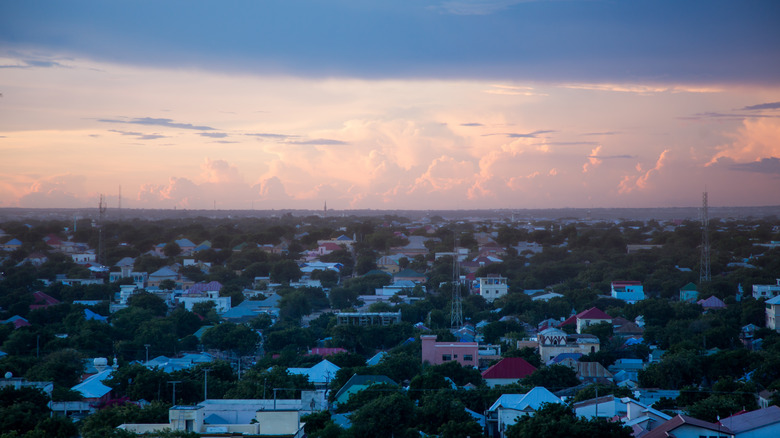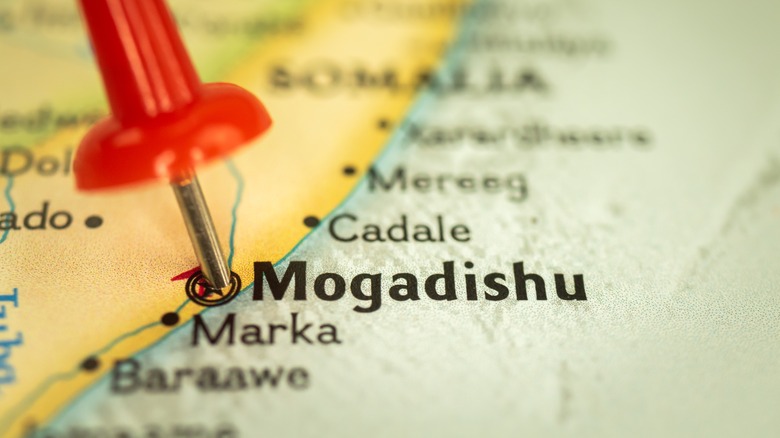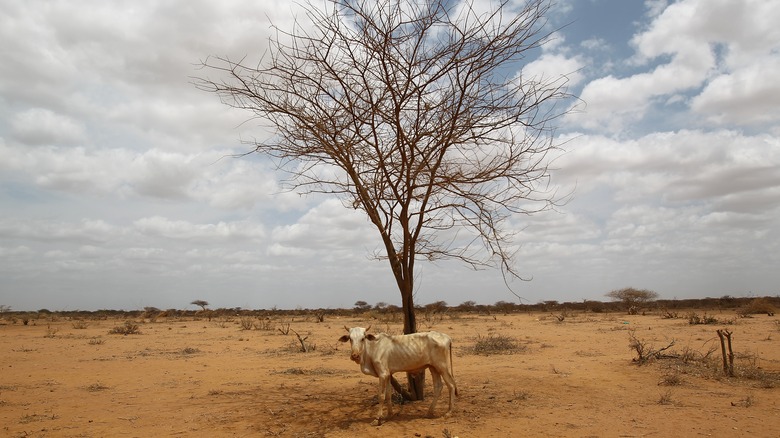This City Has One Of The World's Most Chilling Travel Warnings
When you look at pictures of Mogadishu, the capital of Somalia, you will notice a startling contrast of images. In the top search results, you'll find pictures of azure waters, and the mangled remains of bombed-out cars sitting side by side. In a city where white sandy beaches and bustling marketplaces lie beside devastated buildings, violence lurks constantly beneath the surface. As such, it's highly recommended that Western foreigners not travel to the city at all (via Smart Traveller).
The situation is so dangerous that TIME reported the curious incident of a Canadian tourist who arrived in Mogadishu in 2010 of his own violation — an instance so rare that tourism officials reportedly couldn't wrap their heads around his motives. TIME quotes one official as saying, ”He said he was a tourist, we couldn't believe him. But later on, we found he was serious. That makes him the first person to come to Mogadishu only for tourism."
While it's tempting to find something darkly amusing in the fact that tourism officials couldn't comprehend why they received a tourist. The bitter reality is that the situation in Mogadishu, and throughout Somalia, is nothing short of heart-wrenching.
With volatility and danger looming at every turn, what travel cautions and preparations should potential visitors be aware of before booking any trips? And what is the reason for this turmoil in the first place?
What Western Governments Say
Since civil unrest erupted in 1991, Somalia has garnered a reputation in the world's media as one of the most turbulent countries in the world and has suffered immensely in recent decades. Accounts of Somalian pirates seizing ships are of course well known, but abductions and vehicle bombings are also common in this Sub-Saharan country (via Horn Institute).
One simply has to head to the U.S. State Department's website for travel warnings to its citizens to find eyebrow-raising recommendations. Citizens are advised to ”draft a will” and arrange with their loved ones who'll take care of their ”children, pets, property, belongings” and even arrange their ”funeral wishes” before traveling to Mogadishu.
If that wasn't grim enough, it's also advised that travelers arrange for a family member to be their point of contact with ”hostage-takers” and to devise a security question to ask the hostage-takers, in the event they need to know if they're still alive.
These sentiments are eerily echoed by the UK Government's and the Canadian Government's travel advice which discourages tourists from visiting Somalia. Nevertheless, let's imagine for a second that you did make it to Mogadishu, the reality is you would likely be confined to your guarded, fortified hotel or resort.
Even then, there's no guarantee that staying in your hotel would be safe. In August 2022, the Hayat Hotel in Mogadishu was besieged and stormed by Islamist militants who killed 21 people and injured 117 (via BBC News). In the past, airports have also been attacked as many Westerners and government officials must pass through them, per AP News.
Reasons for The Turmoil
Due to nearly three decades of terrorist attacks, organized crime, and constant political instability, many malevolent forces have had a stranglehold on the region. Mogadishu itself is a city flanked by checkpoints and its police and military forces must always remain vigilant for attacks and armed violence (per Horn Institute). The law requires that foreigners must hire individual armed security police units (called S.P.U.s) to accompany them at all times when traveling throughout Somalia's cities and towns (via Horn Risk Management).
This civil war has ravaged the landscape for three decades and has led to Somalia falling way behind other Sub-Saharan African nations in terms of economic development. The World Bank makes the devastating estimation that seven out of 10 Somalis live under the poverty line.
To make matters worse, millions of Somalians are at risk of impending famine, as the country is suffering its worst drought in years (via BBC News). This situation is further exacerbated by al-Shabaab, an extremist Islamic terrorist group that is an offshoot of Al Qaeda, which has killed thousands of civilians since first being founded in 2006 (via Vision of Humanity).
In their quest to establish an Islamic state, extremists frequently attack public spaces, including markets, government offices, hotels, and restaurants in the nation's capital (via NPR). Due to their murderous modus operandi of attacking aid workers, many in Somalia aren't getting the help they desperately deserve, particularly those living in rural areas, per BBC News.


